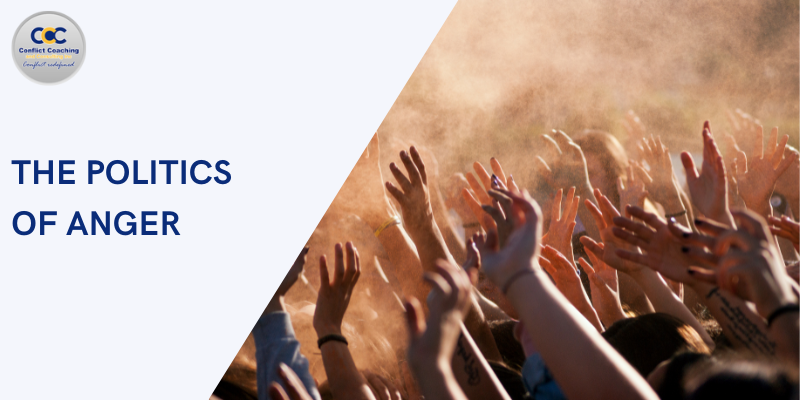
The Politics of Anger: 10 Practical Strategies to Address
Anger is a powerful emotion, and in politics, it’s often a driving force. We’ve seen how political anger can rally crowds, divide communities, and spark massive movements.
From heated arguments at the dinner table to aggressive posts on social media, emotions are running high in America’s political climate.
And it’s not just online!
Many of us have felt tension spill into our daily lives—whether it’s avoiding certain coworkers because of political views or dreading family holidays because of what might come up at the table.
The politics of anger came into sharp focus during events like the January 6 insurrection, where fury over an election result turned into violent unrest.
But that wasn’t the beginning—it was a symptom of something much deeper.
According to a 2023 Pew Research study, more than 65% of Americans say politics makes them feel angry, not hopeful or inspired.
This emotion is no longer just a side effect of policy disagreement—it’s become a tool used to motivate, divide, and control.
In this article, we’ll explore how anger is used in politics—sometimes for good, often for harm.
We’ll look at how it impacts democracy, how it shows up in our daily lives, and what we can do to handle it in healthier, more productive ways.
The Use of Anger as a Political Tool
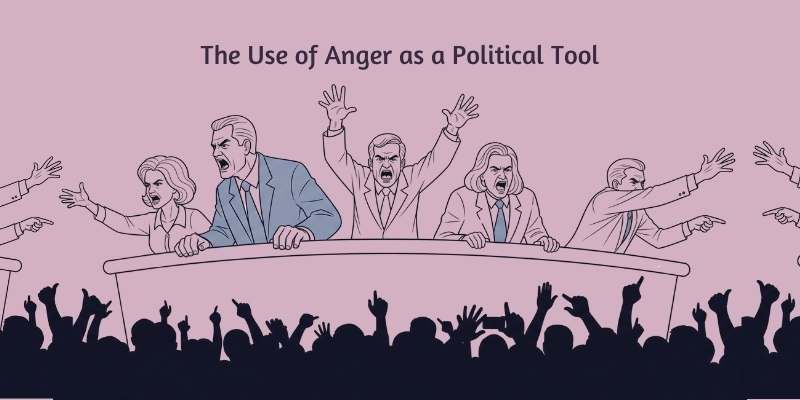
Anger has long been a powerful force in political life. Throughout history, it has sparked revolutions, civil uprisings, and dramatic social change. In many ways, political anger has been essential in challenging oppressive systems and demanding justice.
Think of the American Revolution, the civil rights movement, or women’s suffrage; each was fuelled by a deep emotional response to injustice and inequality.
In these moments, anger in politics served as a motivator, uniting people around a common cause.
But while anger once played a role in collective liberation, today it’s often used differently. In our current political climate, anger is increasingly manipulated as a tool to gain attention, control narratives, and divide citizens.
Politicians and media outlets frequently tap into public frustration—not to inspire thoughtful dialogue, but to provoke outrage.
From sensational headlines to emotionally charged debates, modern political discourse often prioritizes reaction over resolution.
Studies show this shift clearly. According to the American Psychological Association, over 70% of U.S. adults feel stressed about the nation’s future, and nearly half cite politics as a major source of stress.
Meanwhile, Pew Research reports that partisan hostility has reached record highs, with both Democrats and Republicans more likely than ever to see the opposing party as a threat to the country.
This emotionally charged environment is no accident. Politicians often use emotional manipulation in politics to rally supporters, framing opponents as enemies and issues as existential crises.
The result is a public that is politically motivated—but also deeply divided and emotionally exhausted.
In this context, anger in politics is no longer just a response to injustice; it has become a carefully crafted political tool.
One that, if left unchecked, threatens to erode empathy, understanding, and the foundation of democratic dialogue.
The Impact of Anger on Democracy and Social Cohesion
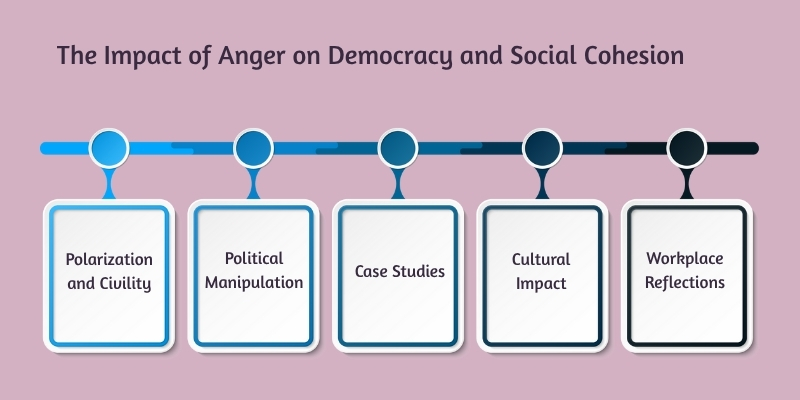
Anger has become a defining feature of modern political life, but its consequences go far beyond party lines and ballot boxes.
When political anger dominates public discourse, it begins to erode the foundations of democracy itself.
Civility, compromise, and mutual respect—all essential for a functioning democratic system—start to break down under the weight of constant outrage.
1. Polarization and Civility
In today’s divided America, it’s not uncommon for political conversations to quickly turn hostile.
Families avoid topics over dinner, neighbors unfollow each other on social media, and even lawmakers struggle to work across the aisle. This deepening political polarization is fueled by ongoing emotional provocation.
When anger becomes the norm, empathy disappears. Instead of seeing fellow citizens as people with different ideas, they’re often framed as enemies.
A 2022 Gallup poll found that only 20% of Americans trust the federal government to do what is right, reflecting growing frustration and emotional fatigue.
Constant exposure to angry political rhetoric chips away at civil debate and encourages combative behavior over collaboration.
2. Political Manipulation
Some leaders have learned to weaponize this anger. Figures like Donald Trump and Vladimir Putin thrive in emotionally charged environments, redirecting public frustration toward specific groups—immigrants, the media, or the so-called “deep state.”
This tactic, often rooted in politically motivated fearmongering, turns “free-floating anger” into a powerful tool for control.
By presenting these groups as threats, leaders give anger a target, even if that target is based on exaggeration or falsehoods.
This redirection fosters political unrest, intensifies tribalism, and distracts from deeper systemic issues.
3. Case Studies: January 6 and Media Outrage
The January 6 Capitol insurrection is a stark example of how unchecked political anger can spiral into political violence.
Driven by misinformation and a sense of betrayal, citizens turned on their own institutions. Fueled by partisan media and social media echo chambers, their anger escalated into an attack on democracy.
Similarly, media-fueled outrage—from talk shows to cable news—keeps the public in a constant state of agitation.
Outrage sells, and networks often prioritize emotional engagement over balanced reporting, making political discourse more reactive and less reasoned.
4. Cultural Impact
The consequences of anger in politics extend into culture as well. Entertainment becomes more politically charged, classrooms become battlegrounds for ideology, and even sports arenas aren’t immune to political division.
The normalization of anger reshapes how we consume information, interact with each other, and define social norms.
5. Workplace Reflections
This political hostility has seeped into the workplace, too. Bullying, microaggressions, and toxic work environments are increasingly linked to the stress and tension people carry in from political arguments and media exposure.
When coworkers bring their frustrations to the office, it creates division, reduces productivity, and undermines team cohesion.
In short, political anger doesn’t just disrupt government—it affects our communities, our culture, and our everyday interactions. If left unchecked, it threatens both social harmony and the democratic process itself.
10 Practical Strategies to Address Political Anger: A Mindful Approach
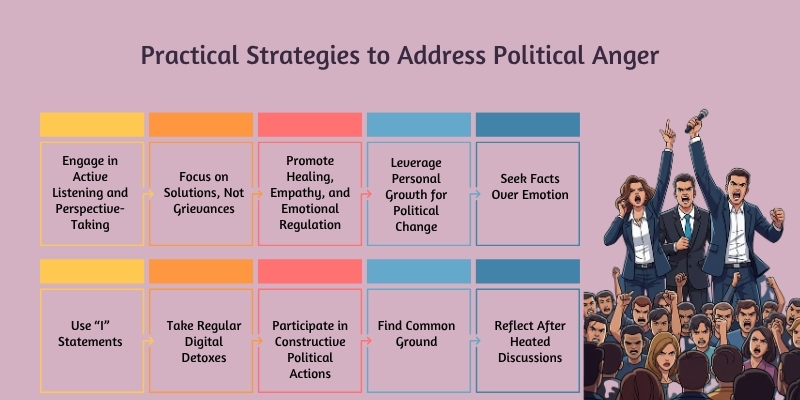
The emotional temperature of political conversations in America is rising. From heated online arguments to real-world confrontations, political anger has become a regular part of our daily lives.
While anger can sometimes be a healthy response to injustice, unchecked and misdirected anger threatens civil discourse, relationships, and our ability to solve real problems.
That’s where emotional regulation and mindfulness come in. Rather than reacting impulsively, we need to develop skills that help us recognize our emotions, pause before responding, and engage with others more thoughtfully.
Practicing mindfulness for political anger doesn’t mean silencing your opinions—it means responding in ways that promote understanding, accountability, and progress.
Below are 10 practical strategies that encourage healthier political engagement and personal well-being.
1. Engage in Active Listening and Perspective-Taking
In a polarized society, listening with the intent to understand is a radical act. Instead of waiting to argue, pause and actively listen to others—especially those with differing views.
Practicing perspective-taking helps lower defensiveness, reduce political anger, and increase empathy.
Studies show that when people feel heard, they’re more likely to engage constructively—even during disagreements.
2. Focus on Solutions, Not Grievances
Political discussions often get stuck in cycles of blame, resentment, and rehashing past wrongs. While it’s important to acknowledge injustice, we must also ask: What now?
By shifting toward solution-focused dialogue, we reduce the emotional charge and increase collaboration. This approach promotes accountability without spiraling into anger-fueled debates.
3. Promote Healing, Empathy, and Emotional Regulation
Healing the fractures in political discourse starts with empathy and self-regulation. Emotional intelligence—not just intellect—is essential for civil conversation.
Use mindfulness techniques like breathwork or grounding exercises to remain calm in tense moments. Doing so helps us access patience and compassion—both crucial for bridging political divides.
4. Leverage Personal Growth for Political Change
Real political change begins with individual transformation. Anger management exercises, journaling, and therapy can help process emotions before bringing them into public conversations.
When we invest in personal growth, we show up to political discourse with clarity and purpose, not just passion. This allows us to contribute with integrity, not just intensity.
5. Seek Facts Over Emotion
Misinformation and emotionally charged content fuel many political conflicts. Grounding conversations in verified information is essential.
When you encounter a claim that stirs anger, pause and fact-check. Focusing on truth over emotion encourages informed debate and reduces manipulation by false narratives—an increasingly urgent need in today’s political discourse.
6. Use “I” Statements
Saying “You’re wrong” sparks defensiveness. Saying “I feel frustrated when…” opens space for connection.
Using “I” statements shifts the conversation from blame to experience. This simple tool lowers the chance of escalation and builds mutual respect—even during disagreements.
7. Take Regular Digital Detoxes
News cycles and social media platforms are designed to provoke outrage. Taking regular digital detoxes helps regulate emotions and gives you a break from constant political stimulation.
Limit time spent on emotionally charged platforms, unfollow inflammatory accounts, and make space for reflection. Your mental health—and your political conversations—will benefit.
8. Participate in Constructive Political Actions
Anger needs an outlet—but not all outlets are helpful. Instead of venting online, channel your frustration into constructive action.
Volunteer, organize, write to representatives, or support local change efforts. Transforming anger into positive momentum reduces hopelessness and reinforces your agency in the political table.
9. Find Common Ground
We often focus on what divides us, but most Americans share core values like safety, fairness, and opportunity.
Identifying common ground doesn’t mean watering down your beliefs—it means building a base for cooperation. Shared goals make respectful dialogue more achievable, even in a charged political climate.
10. Reflect After Heated Discussions
After a political argument, take time to cool down and reflect. Ask yourself: What triggered me? What did I learn? What would I do differently next time?
This type of emotional awareness promotes growth and helps you approach future discussions with more confidence and clarity.
These strategies aren’t just helpful—they’re necessary. As political tensions continue to rise, practicing mindfulness and emotional regulation is one of the most powerful things we can do to protect our democracy and our relationships.
Expert Opinion
Dr. Ryan Martin, a psychologist who studies anger and political emotion, explains:
“Anger isn’t the problem—how we handle it is. Recognizing and understanding your anger gives you the power to respond constructively rather than react destructively.”
Similarly, political analyst and scientist Taylor Carlson documents:
Approximately 1 in 3 American voters primarily learn about politics from socially transmitted information. Relying solely on these sources is particularly problematic in social networks that are homogeneous and this will ultimately lead to angry politics.
Conclusion
The current political landscape may feel like a constant battle of outrage, but it doesn’t have to stay that way.
While the politics of anger has contributed to division, fear, and frustration, it also reveals something powerful—people care deeply about the world around them.
That passion, when guided with emotional intelligence and mindfulness, can become a force for meaningful change rather than continued conflict.
We don’t need to eliminate anger from politics; we need to better understand and manage it.
Emotional regulation, empathy, and respectful dialogue are not signs of weakness—they’re essential tools for preserving democracy and rebuilding trust across political lines.
Now is the time to pause and reflect. Ask yourself how anger influences your views, your conversations, and your daily life.
Begin shifting from reaction to response. Support conversations that focus on solutions, not just blame. Disconnect from outrage cycles that wear you down and instead engage in actions that lift communities up.
By choosing a more mindful and compassionate path, each of us can help shape a political culture that values truth, unity, and progress—without sacrificing passion or purpose.
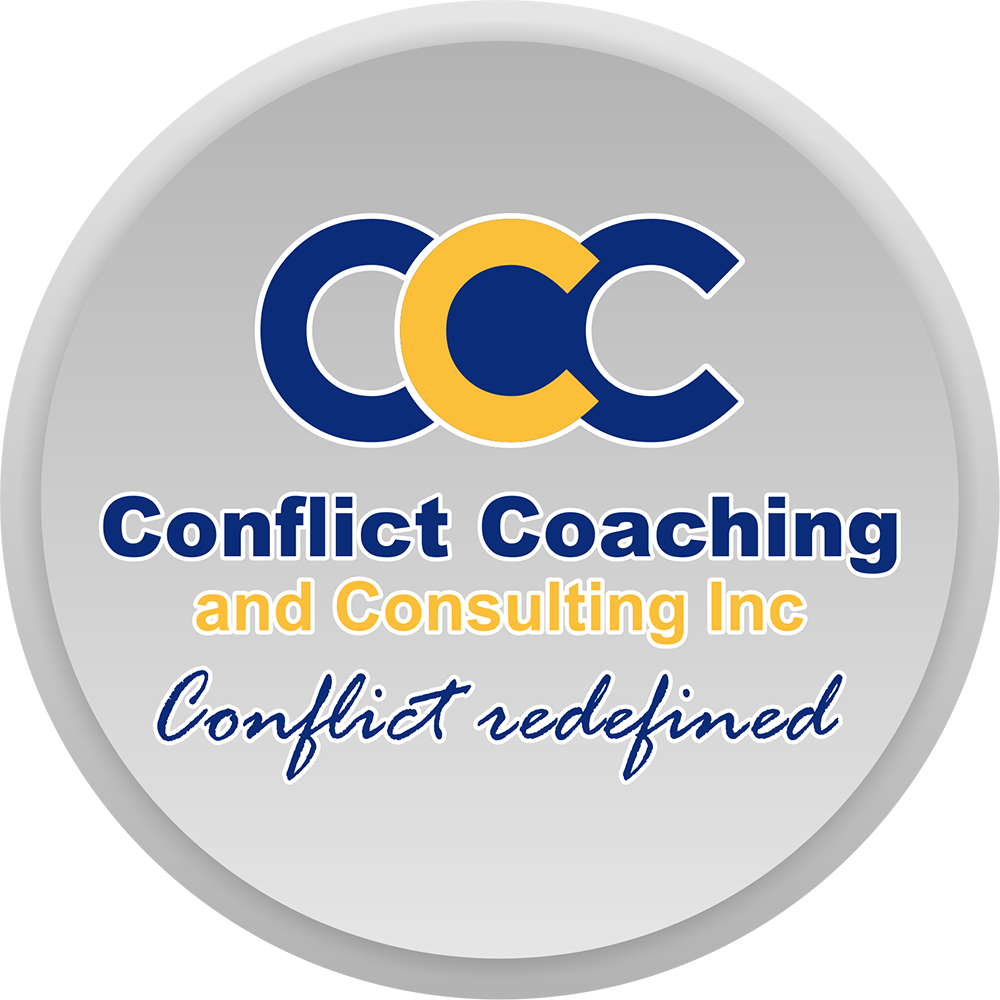

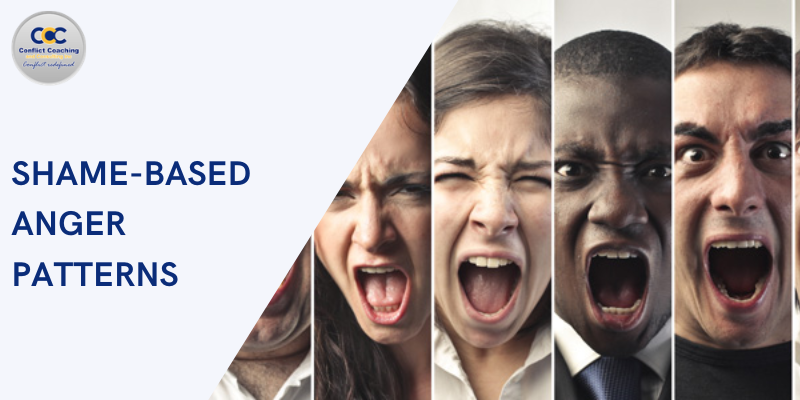
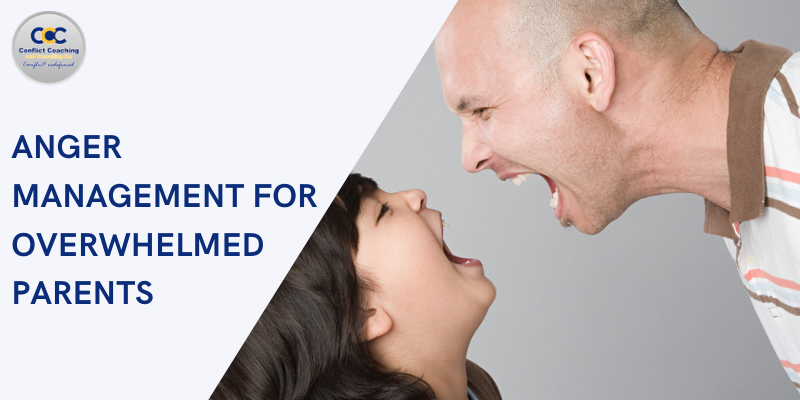

Responses